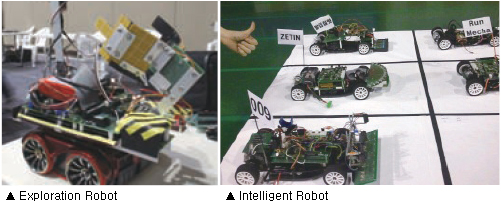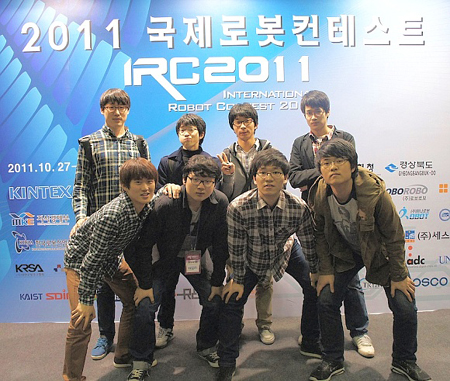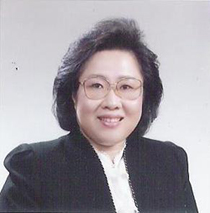A Central Club called ZETIN, in which students assemble and study Micro Robots, boasts 21 years of history with numerous awards received from various robot contests. From Cleaning Robots to Exploration Robots, ZETIN is proud to present different sorts of robots with high technical skills which are unmatched when compared with those of other teams. For Focus on the UOS, I interviewed the president of ZETIN, Lim Jin-yeon (School of Electrical and Computer Engineering, 07’).
What does ZETIN mean?
ZETIN is an abbreviation for ‘Zero to Infinite,’ meaning ‘to make something out of nothing.’
What do you usually do in ZETIN?
When you first join ZETIN, you get to learn about a few robots and make them by yourself, gaining basic knowledge about robots and gaining experience of working with them. Then when you become a sophomore, you can participate in robot contests.
Do students have to major in engineering to join ZETIN?
ZETIN first started as a sub-club in the School of Electrical and Computer Engineering and became a campus club. As a Central Club, any student can join regardless of their major. But the thing is, since our club is closely related with Electrical and Computer Engineering, students majoring in other fields usually struggle a lot after some time. This is why most of the members of ZETIN are from the School of Electrical and Computer Engineering. Others are usually from Mechanical and Information Engineering or the School of Computer Science.

There is a robot called ‘Cleaning Robot’ which picks up particles of dust or substances and is also able to locate itself by drawing a map of the area around itself. In the contest, the robot that cleans the greatest amount of dust or substances and clearly locates itself according to the map wins. In the case of Intelligent Robot, the robot which finished a race first used to win the contest. Now, the rules have changed and robots have to trace a model car, keeping a constant distance away from it throughout the whole race. There is also an Exploration Robot which is able to bring an object from within a surrounded area while remotely controlled.

Students might think that our club is for nerds and intelligent students when they first come across ZETIN, but this is not true. We do not always work with robots. You are more than welcome to come and join us just to get along and socialize with people in ZETIN, so feel free to do so anytime.
All photos credited by ZETIN
Show Great Appreciation For Your Career -Prof. Nam Duk-soon
P
Professor Nam, since you have been teaching at the UOS for over 30 years, you must have a strong attachment to the UOS then.
I became one of the youngest professors in my early thirties. I have spent so many years at the UOS that I am totally attached to the university and I consider it as my own school where I graduated and even like my own sweet home. I have never even considered teaching at another university with the exception of teaching at a host university during my sabbatical leave. The main reason why I am teaching at this university is that I have shared so many memories and even developed a strong affection for the school, not to mention that I have spent my passionate youth here.
Since your major is vocal music, you teach students singing. What is the reason why learning vocal music is different and special compared with learning instruments?
More than anything else, vocal music is what I consider as a gift from God. The human body can be regarded as a gifted instrument. What is fascinating about vocal music is one’s ability to make sounds through our bodies that help us to convey our inner-most souls. Probably the most challenging task for music majors is their ability to clearly express and enunciate from the song’s given or musical texts. In order to accurately articulate, the students have to familiarize themselves with Italian, German, French, English and even Korean dictions.
Most of the students who major in music are probably concerned about the high unemployment rate for musicians. Do you have any advice to such students who may be struggling to find a compromising point between their dream and reality?
I am aware of the high unemployment rate for those who have music as a professional career; however the issue of unemployment affects many professions, and it does not mainly target musicians. It affects all of us in one way or the other and poses a serious threat to society as a whole, thus, becoming a great societal concern. What I want to emphasize is that all of this boils down to one’s sincere passion, love, and dedication to the field that one has planned to pursue. Having music as a career, just like any other profession, requires a lot of discipline, patience and commitment. Thus, if you are in it for the wrong reasons, you are making it even more difficult for yourself to achieve success. If one considers his or her career and shows great appreciation for it, then, it is a key to true blessing and happiness!
Kim You-jin Junior Reporter
cleo9207@uos.ac.kr

